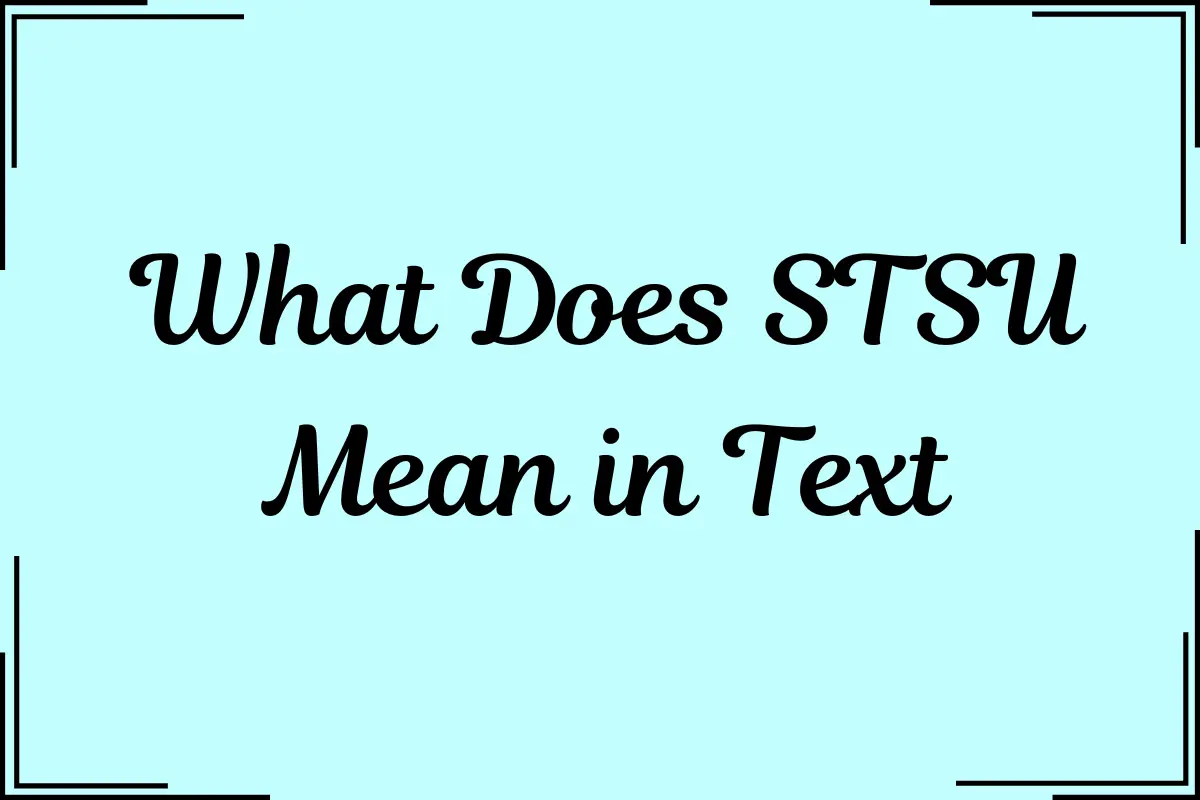In our digital-first world, texting and chatting have evolved their own languages. Acronyms, abbreviations, and slang terms appear everywhere—on social media, messaging apps, and even workplace chats.
One abbreviation you may have come across is STSU.
If you’ve ever received this in a message and wondered, “What does STSU mean?”, you’re not alone.
This guide explains everything you need to know about STSU, including its meaning, how to use it, where it came from, and why it matters in online communication.
Why Are Acronyms Like STSU So Popular?
Before we unpack STSU, let’s look at why abbreviations have become so common:
✅ Speed – Typing out full sentences takes time, especially on mobile.
✅ Brevity – Social media apps like Twitter and Snapchat limit characters.
✅ Casual Tone – Shortened forms feel friendly and relaxed.
✅ In-Group Language – Knowing the lingo shows you’re part of the community.
Think about how often you see these familiar acronyms:
- BRB (Be Right Back)
- LOL (Laugh Out Loud)
- SMH (Shaking My Head)
- IDK (I Don’t Know)
- TBH (To Be Honest)
STSU is a newer entry to this lexicon, serving a unique purpose.
What Does STSU Mean in Text?
The most widely accepted definition of STSU is:
“Sorry To Shut You up”
This phrase is a polite, self-aware way to apologize for dominating the conversation or cutting someone off.
Essentially, if you realize you may have silenced someone unintentionally, you can say STSU to acknowledge it.
Other Interpretations of STSU
While “Sorry To Shut You up” is the primary meaning, you might see other interpretations depending on the context or community:
- “Stay True, Stay Unique” – A positive affirmation of individuality.
- “Still Thinking Stuff Up” – Used to say you’re brainstorming.
- “So True, So You” – Complimenting how authentic someone is.
Tip:
If you’re not sure which meaning applies, read the surrounding conversation or ask the sender for clarification.
How Do You Use STSU in a Sentence?
Here are real-world examples showing STSU in action:
Example 1: Apologizing for Dominating
I didn’t mean to take over the chat. STSU if I came across that way.
Example 2: Acknowledging an Interruption
Oops, I think I cut you off. STSU, go ahead.
Example 3: Softening a Rant
Wow, I’ve been rambling forever. STSU lol.
Example 4: In a Group Project Chat
I know I shared a lot of ideas. STSU if you had something else in mind.
Example 5: Joking After a Strong Opinion
Pineapple absolutely belongs on pizza. STSU but I stand by it.
Each example shows STSU as a friendly, non-confrontational way to stay aware of how you’re coming across.
Where Did STSU Come From?
Unlike older acronyms like LOL or BRB, STSU likely originated on online communities such as:
- Discord – Used in gaming chats to maintain friendly collaboration.
- Reddit – Especially in subreddits where long discussions happen.
- Twitter – Short character limits made abbreviations necessary.
- Tumblr – Known for coining and spreading unique acronyms.
Although the exact origin is hard to pinpoint, searches on Urban Dictionary confirm its presence dating back to around 2017–2018.
Why Do People Use STSU?
Let’s break down why STSU caught on:
✅ Politeness
It shows you’re aware that you might have been overbearing.
✅ Efficiency
Typing “Sorry To Shut You up” repeatedly feels awkward and long.
✅ Tone
STSU sounds softer and more casual, reducing the chance of tension.
✅ Humor
Used with emojis or in a joking tone, it can diffuse awkwardness.
✅ Inclusiveness
It keeps conversations balanced, showing respect for others’ contributions.
How Is STSU Different From Other Abbreviations?
Here’s a handy comparison table to avoid confusion:
| Abbreviation | Meaning | Tone |
|---|---|---|
| STSU | Sorry To Shut You up | Polite, self-aware |
| STFU | Shut The F*** Up | Rude, aggressive |
| IDC | I Don’t Care | Neutral, sometimes dismissive |
| TBH | To Be Honest | Neutral, clarifying |
| BRB | Be Right Back | Informative, casual |
Important:
STSU is often misunderstood as STFU, so always double-check before sending!
When Should You Use STSU?
Best Situations:
✅ Friendly chats
✅ Group discussions where you talk a lot
✅ Informal work channels (if you know your team well)
✅ Discord servers
Avoid in:
❌ Formal work emails
❌ Academic writing
❌ Conversations with people unfamiliar with internet slang
How to Respond When Someone Says STSU
When you see STSU, here are friendly ways to reply:
✅ “No worries, you didn’t shut me up!”
✅ “It’s okay, I was done anyway.”
✅ “Haha, all good. So as I was saying…”
✅ “Don’t stress about it!”
A warm response reassures the other person that no harm was done.
How to Explain STSU to Others
If a friend asks you “What does STSU mean?”, here’s a quick reply you can copy-paste:
STSU means ‘Sorry To Shut You up.’ It’s a polite way to say you didn’t mean to dominate or interrupt.
Common Questions About STSU
Q1. Is STSU rude?
A: Not at all—it’s actually the opposite. It’s polite and considerate.
Q2. Is STSU the same as STFU?
A: No. STFU is aggressive. STSU is an apology.
Q3. Should I use STSU at work?
A: Only in very casual settings where everyone uses abbreviations. Otherwise, type out the phrase or say, “Sorry if I interrupted.”
Q4. What does STSU mean on Reddit?
A: Same meaning—“Sorry To Shut You up.” You’ll see it in discussion threads where someone realizes they posted a long reply.
Tips for Using STSU Effectively
✅ Keep it light. Pair it with humor or emojis when appropriate.
✅ Be genuine. If you really hurt someone’s feelings, follow up with a sincere apology.
✅ Avoid overuse. Using STSU every other message can seem performative.
✅ Know your audience. If you’re chatting with someone unfamiliar with internet slang, consider spelling it out.
Final Thoughts
STSU has become a useful shorthand for showing respect in digital conversations. Whether you’re chatting with friends, gaming, or collaborating online, it helps you:
- Acknowledge when you’ve spoken over someone
- Keep discussions open and friendly
- Express self-awareness with just four letters
So next time you feel you’ve dominated the chat, don’t be shy—drop an STSU and keep the conversation flowing.











